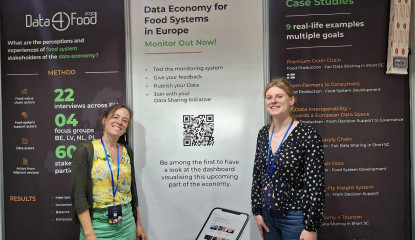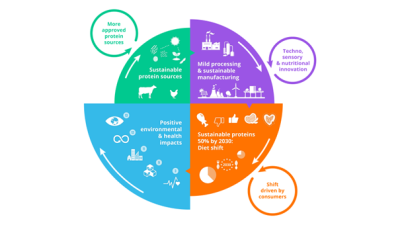Data4Food2030: Data helps us make European food systems more sustainable in social and environmental terms

Big data is a very powerful tool that we have at our disposal, but in order to be put to effective use for food systems, big data has to be captured, analyzed and acted upon. Yet, stakeholders pose a significant question: Can data help us make European food systems more sustainable in social and environmental terms? The answer is yes, the EU project Data4Food2030 can, if we govern it well and build trust amongst all stakeholders, including marginalized groups whose access to data is limited because of gender, remote/rural geographical location or ethnic background.
It is getting easier every day to use technology to meet our sustainability needs. We can install sensors on everything on the farm and at every step in a food value chain until it reaches the consumer - in other words, getting big data has never been easier. Substantial funding is being directed towards technical science and big data, but more attention needs to be paid to how these affect the society at large, and if those who share their data trust how it is used. Stakeholders from nine different EU countries will be part of nine case studies, representing food system related service provision in 27 EU countries, involving 38 core and supporting partners as well as numerous stakeholders – partners, suppliers, consumers.
Project coördinator Mireille van Hilten (Wageningen University Social Economic Research): "Our research project creates shared value from the data ecosystem and the food system ecosystem of stakeholders such as data providers, farmers, food system operators, policy makers and manufacturers. But stakeholders told us in interviews that equal access to data, the ability to use data and the abundance of data can undermine decision-making. Economic focus can lower the priority of environmental and social sustainability. Future scenarios of the data economy will help understand actions for fairer co-creation of data services in the agri-food sector."
Impact
These nine case studies provide real-life examples of the data economy at micro- and meso-economic level, deploying data and technologies. These examples are studied for mapping and improving the data economy to promote data-enabled business models that are fair and inclusive and broadly cover areas such as food production, supply chain and circular economy. Data4Food2030 targets an improved future state of the data economy for food systems from which clear design principles, recommendations and solutions are derived.
More info: https://data4food2030.eu/, https://www.wur.nl/en/research-results/research-funded-by-the-ministry-of-lvvn/types-research/soorten-onderzoek/kennisonline/eu23060-data4food2030.htm, https://www.linkedin.com/company/data4food2030/posts/?feedView=all, Data4food2030 Horizon Europe Project - YouTube
